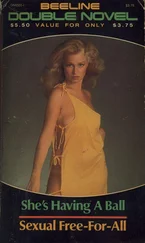Flash and Lou went out to get the cigarettes. They were gone for over an hour.
“What took so long?” Gene asked her.
Lou shrugged.
“Stopped for a beer.”
When Gene finished writing what he knew was finally his final Final Exam he went over to the Captains Bar in the Statler and ordered a vodka martini on the rocks. It was not quite 11:00 A.M. and the only other customer was a white-haired gent at the bar with a glass of beer. Gene settled himself at one of the little tables along the wall and a waitress who was wearing a miniskirted sailor suit with black net stockings and bowling shoes brought him the drink and a little bowl of peanuts. It was dark and quiet and anonymous. Gene especially liked hotel bars for drinking alone because they gave him the illusion he was not in any particular place, he was simply in a hotel, which might be anyplace, and no one was likely to find you or know where you were. It was like getting out of town for a while without really having to leave.
He took a sip of the drink, saluting himself in silence, having to smile in spite of it all at the irony of such solitary celebration on this long-anticipated occasion. He had thought when he finally if ever finished his marathon college career he would throw the biggest bash of his history, and that would be pretty damn big. He would buy enough booze and dope to last a week, build a giant stew that would never stop, and go among the guests wearing nothing but his academic robe, bestowing blessings and bounty. Best of all Lou would be proudly beside him, her faith in him justified, her passion intensified. She, clad only in her own academic gown, would stroll with him, hand in hand, and occasionally after spreading their benevolence over the party they would quietly go to the bedroom and close the door, slip off their robes that would fall in a black swirl to the floor, and, supremely naked, make educated love.
Instead, he was hiding out in a hotel bar, putting off the subject of what should have been his triumph in getting a degree he didn’t want because other people’s hearts would break if he didn’t have it, because the mention of it to Lou would immediately raise the now more painful subject expressed in the single nagging sentence: “What are you going to do?”
When you grow up?
He guessed he was grown. He could still remember how adults always asked him as a kid, as they asked all kids:
“What are you going to be when you grow up?”
“I’m going to be a fireman.”
Gene fixed on that because he found it made them happiest.
“Fireman.”
It was what they expected you to say. It was cute. It proved their adult superiority because they knew you wouldn’t be really, you were just a kid and didn’t know any better and thought it was exciting to answer alarms and ride in a bright red truck with a siren and slide down a pole.
“Did you hear that? He’s going to be a fireman!”
Ooh, ahh, chuckle, inneeee sweeet?
Other kids didn’t ask. Just grown-ups. Other kids might say what they were going to be, but they were too polite to ask you , you could say or not.
All were taught to chant the list of job opportunities:
Rich man, poor man, beggar man, thief;
Doctor, lawyer, Indian chief.
Gene found none of the above appealing. He liked the idea of being an Indian, but didn’t aspire to Chief. Indian or Fire. Lack of responsibility. No ambition. Directionless. Boat without a rudder, ship upon the sand.
Maybe if things had worked differently he’d have gone on working in his dad’s grocery, from part-time as a kid to full time as a man, having a kid of his own to work part-time and then passing on the store to him, and him to his kid, just like some kind of natural cycle, like birds migrating, knowing what to do and where to go without having to ask or think about it.
He had liked the store, the clean smell of it, aromas of vegetables, everything fresh, the real touch of fuzzy-skinned green beans, slick limes, soft green foliage crown of a bunch of radishes, hard golden teeth of the smiling corn. Now all that was wrapped and sanitized and sealed, laid out under the antiseptic supermarket aura that was neither night nor day, the droning fluorescent neutrality.
His father saw it coming, so Gene as a kid knew the store would no longer be there when he grew up.
“The chains are coming,” his father prophesied so often at supper while his mother listened with gloomy respect. “They will kill off the little man, the independent. The little man believed because he wanted to believe that people in a hurry might switch to the chains but the faithful old customers wouldn’t desert us, prefer to spend a little more and get personal service, friendly attention, a better cut of meat, but that was a pipe dream. The chains are getting stronger and soon will squeeze the rest of us out.”
As a little kid Gene pictured these giant chains, link upon gargantuan link, slinking and clanking through the streets, wrapping themselves around the little men, squeezing them till they were limp, their poor pink tongues hanging out in deathly surrender.
When his father’s prophecy was filled by one of the chains putting up a giant store three blocks away, he sold his own place at a loss and took a job as a butcher at the chain store, working invisible behind the walls, not seeing or being seen by the customers.
So instead of a grocery store he got from his father the money to get a degree. His father, solemn, said he had saved it just for that purpose, that even though he couldn’t pass on the store he could give him this opportunity which counted for more. He believed in the college degree with the fervor and faith of those who never had one, imagining the possession of it opened all doors, solved all material problems. If you had it, his father explained, you could write your own ticket.
To where?
Hell, at least one power the goddam degree had was making his daddy happy knowing he had it.
After another vodka martini he decided to call. Give the old man the pleasure of knowing. No sense to wait for the actual piece of paper, he would send that along when it came.
He paid his check and got a couple of bucks worth of change and went to one of the public phones in the corridor leading to the lobby. He got his married sister’s number from Chicago information and plinked in the coins.
“Hey,” he said when she answered, “this is Gene. In Boston.”
Maybe she’d forgot. Who or where he was.
“The old man around?” he asked.
“You don’t know, do you?”
It was not a question but an accusation. Her voice like a knife.
“How the hell should I know?”
“You’re his son, that’s all.”
He was sure as hell not going to feed more money in just to get a lecture on how he should keep in touch, be a better son.
“Look,” he said, “just tell him I finished up my credits. I’ll get the degree. Tell him I’ll write the details.”
“Don’t bother. He’s dead.”
“What?”
“December. We tried to find you.”
He realized the phone was in Lou’s name, he had never put his address on the postcards he sent when he moved, when he reported he was going back to school. He didn’t even say which one.
The operator told him to deposit twenty cents for another three minutes.
“I’m sorry,” he said, and put the receiver back in its cradle.
A man in the phone stall next to his was saying with frantic urgency, “I tell you, I got to have it now , not a month from now.”
Gene walked toward the glass doors at the end of the corridor. He watched the calves of a woman walking ahead of him, wearing a swell-looking fur coat. They were muscular legs like dancers have, the calves knotting as the step went down, then loosening as it lifted. He followed her awhile, absorbed. Concentrating on the calves. He went into a luncheonette and ordered a cup of coffee and French fries. He hadn’t eaten all day. He ate the French fries slowly, separately, purposefully. The coffee burned his tongue. He blew on it, staring at the tiny flecks on the black surface. He wondered why there were always those tiny flecks in luncheonette coffee. Maybe it was his fault. Dandruff maybe. After a while he drank it.
Читать дальше












